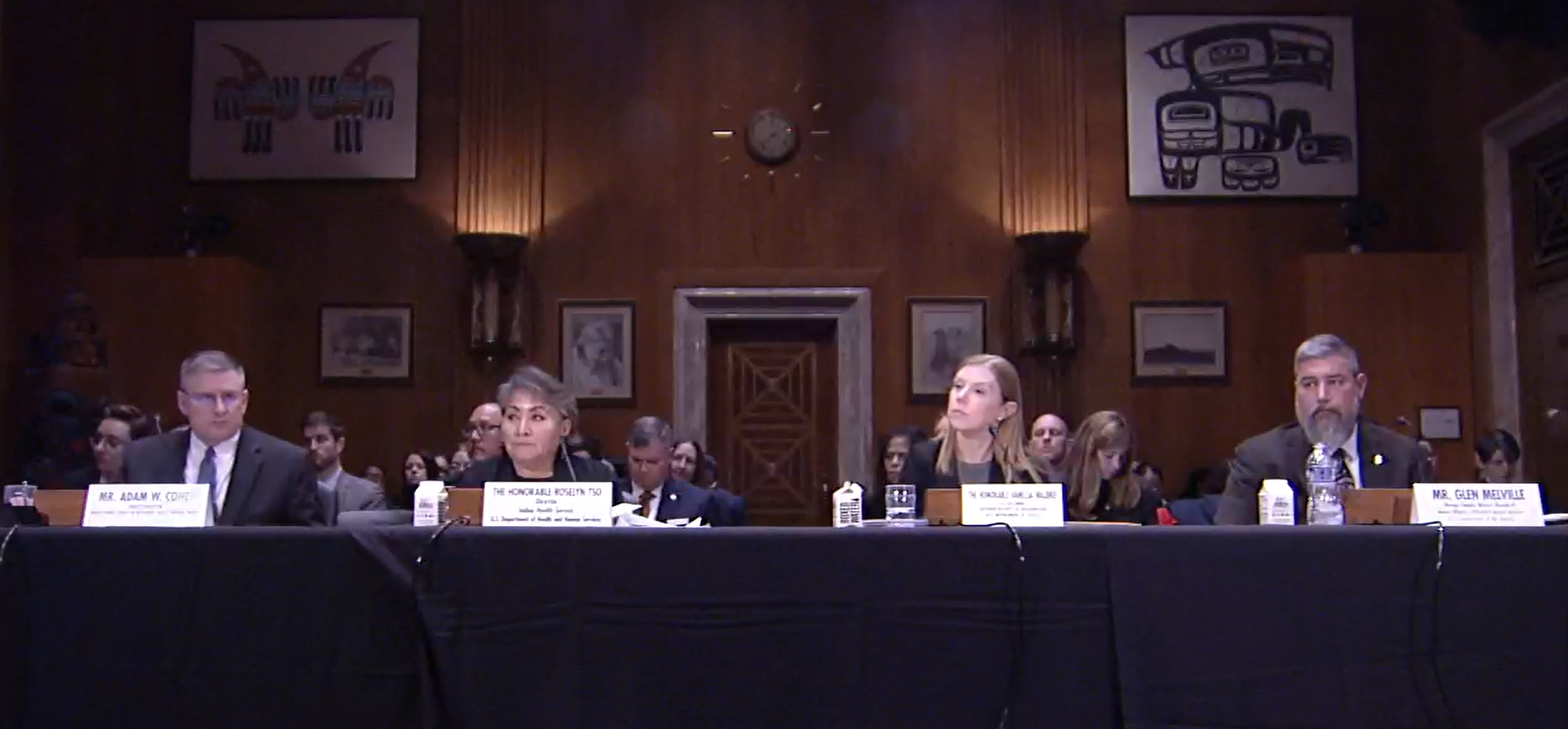SCIA Holds Second Hearing on Fentanyl Crisis

On December 7, 2023, the Senate Committee on Indian Affairs (SCIA) hosted an oversight hearing titled, “Fentanyl in Native Communities: Federal Perspectives on Addressing the Growing Crisis.” SCIA heard testimony from federal partners within the White House, the Indian Health Service (IHS), the Department of Justice (DOJ), and the Bureau of Indian Affairs (BIA). The hearing was a follow up to another hearing SCIA hosted on November 8th where the committee heard testimony from Tribal leaders.
The purpose of the December 7th hearing was to examine the adequacy of federal resources to address the fentanyl crisis in Tribal communities, from public safety to treatment and prevention. The Committee focused on learning how the Biden Administration’s National Drug Control Strategy, to combat fentanyl, actively considers Tribal needs, identifies gaps in resources and interagency coordination, and supports Native-led solutions.
IHS
The Director of the Indian Health Service, Roselyn Tso, discussed the profound toll of the opioid crisis in Indian country, urging Congress to pass the President’s supplemental funding request which would provide an additional $250 million to Tribal communities to address the crisis. She attended the National Tribal Opioid Summit to learn how the opioid crisis is impacting Indian country, emphasizing the need to approach the issue with collaboration and deference to Tribal practices that are working. Director Tso expressed support for Congress to permanently reauthorize the Community Opioid Intervention Pilot Project.
When asked how Congress can build on the success of SDPI, specifically what Congress can do to deliver the same success in the fight against opioids in Indian country, Director Tso explained that SDPI only works because it is Tribally driven. Tribal leaders are stepping in to do what the federal government is not, and those Tribes are seeing success. So, as federal partners, the federal government needs to listen to Tribal leaders and work with them to strengthen communication and work on strategies.
BIA
The Deputy Bureau Director of the Office of Justice Services (OJS) within the BIA, explained that methamphetamine and fentanyl are the biggest emerging drug threats to Tribal communities. 1,590 overdose deaths occurred during FY 23 and 899 non-fatal overdoses in the same year. The Deputy Director also discussed the rise of Carfentanil, a synthetic opioid that is 100 times more potent than fentanyl. He also explained that Tribal healing and wellness courts have been used by Tribal communities and that they are demonstrating success, proving that Tribes best understand the issues and solutions that work for them.
When asked what resources BIA needs to better combat drug trafficking in Indian country, the Deputy Bureau Director explained that there is a lack of interest among trained Tribal members to become part of BIA’s law enforcement personnel and that Congress needs to bring BIA’s salary and benefits packages to a competitive level so BIA can recruit experienced law enforcement personnel, citing that other federal and many state agencies are much more competitive than BIA.
White House
The Deputy Director of the White House Office of National Drug Control Policy (ONDCP), explained overdose deaths continue to climb among AI/AN communities while national deaths have leveled off over recent years. The Biden Administration, in consultation with Tribal communities, developed the National Drug Control Strategy to address the opioid crisis which has helped to increase access to treatment while reducing the supply of fentanyl – leading to decreased overdose deaths in the last two years. ONDCP utilizes two grant programs, the High Intensity Drug Trafficking Areas Program (HIDTA) and the Drug-Free Communities Support Program (DFC). The programs aim to disrupt drug trafficking and to prevent youth drug use before it begins and to fill gaps in the presence of law enforcement throughout Indian country. The Deputy Director discussed how the “Shadow Wolves,” a federal drug task force, seized more than 700,000 fentanyl pills this year. Finally, the Deputy Director urged Congress to pass President Biden’s $250 million supplemental request which will strengthen the Administration’s public health response and ability to prevent fentanyl from getting into Tribal communities.
DOJ
The U.S. Attorney for the Eastern District of Washington State discussed how the DOJ has partnered with the Drug Enforcement Agency to participate in Operation Engage, which has worked with Tribes to raise awareness of the fentanyl crisis while also offering supportive services. The DOJ is also improving programs to assist Tribal members who are re-entering their communities following a period of confinement. In 2024, the DOJ’s Bureau of Justice Assistance will be holding Tribal intergovernmental re-entry workshops to identify strategies to reduce recidivism and victimization.
Conclusion
SCIA has now heard testimony from both Tribal and federal partners on matters relating to the overall opioid crisis in Indian country and detailed testimony regarding the devastating effects of fentanyl in Tribal communities. While SCIA did not offer any next steps, Congress has been steadily moving forward with legislation targeted at decreasing the use and access of illicit opioids like fentanyl, including the FEND Off Fentanyl Act, BADGES Act and Parity for Tribal Law Enforcement Act.
National Indian Health Board
50 F St NW, Suite 600 | Washington, DC 20001 | Phone: 202-507-4070 | Email: [email protected]